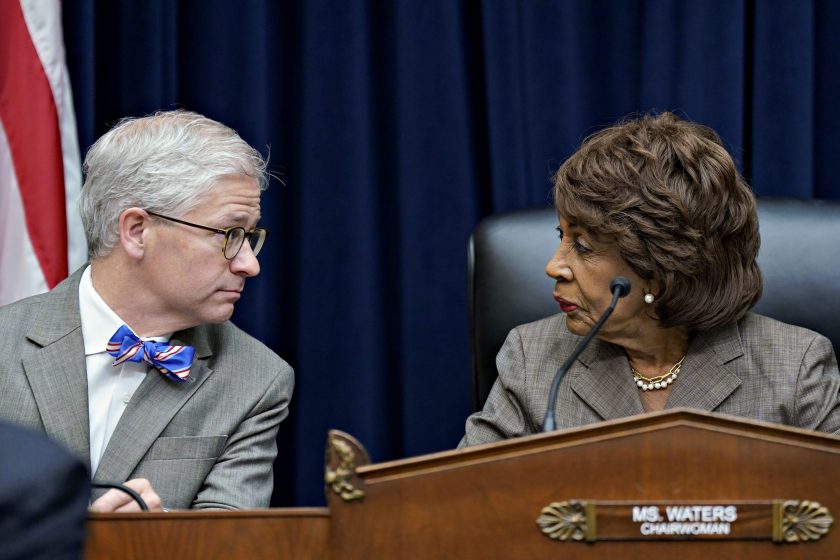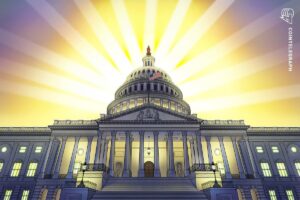House Continues to Struggle with Stablecoin Legislation, No Easy Solutions in Sight for Crypto Regulation


Representative Maxine Waters, a Democrat from California and ranking member of the House Financial Services Committee, right, and Chair Patrick McHenry. Al Drago—Getty Images
Proof of State is the Wednesday edition of Fortune Crypto where Leo Schwartz delivers insider insights on policy and regulation.
We may be well into February, but it’s always Groundhog Day when it comes to a stablecoin bill. I’ve now been covering its progress since October 2022, back when Patrick McHenry (R-N.C.) was the ranking member of the House Financial Services Committee and referred to his effort with then-Chair Maxine Waters (D-Calif.) as an “ugly baby” that would eventually get passed. Speaking at an event in D.C. that month, a pre-FTX collapse Sam Bankman-Fried described stablecoins as the “lowest-hanging fruit” that regulation could address.
A lot has happened since then, to say the least. The Republicans took control of the House, perhaps deflating Waters’s drive to get a deal done. The banking crisis of last March plunged Circle’s reserves into chaos, eroding the crypto industry’s argument that fully collateralized stablecoins could be as safe as a dollar. And just when McHenry finally brought his bill for a committee vote, the White House stepped in, worried that any legislation could undermine the power of agencies like the Federal Reserve and Office of the Comptroller of the Currency.
Normally, I would refrain from writing again about the long-fated bill, whose odds of passage before the next presidential election seem as narrow as the banking system it proposes. But then Waters gave an interview to Politico last week where she claimed that she and McHenry were “very, very close” to a deal—she even added another “very close” for emphasis.
Many in the crypto industry rejoiced, especially given the gloom of anti-money laundering hanging over all discussions of legislation in D.C. Stablecoins, after all, still seem like the easiest path for a bipartisan deal, legitimizing domestic players like Circle and PayPal while gnawing away at the wildcat Tether’s growing dominance.
Reality signaled otherwise. Treasury Secretary Janet Yellen testified at both the Senate Banking Committee and the House Financial Services Committee, emphasizing for the umpteenth time that financial regulators wanted a federal regulatory floor for stablecoin issuers. This has long been the sticking point for negotiations, with Republicans—and some Democrats, especially in New York—wanting to uphold the sovereignty of state regulators like the New York Department of Financial Services.
“Waters may have overstated the situation,” one source working in D.C. crypto policy told me. “There are still a bunch of issues to deal with.” Another told me that McHenry and the Federal Reserve were not close on a deal. “It’s looking less and less promising as each day goes by,” they said. McHenry’s office did not respond to a request for comment.
Adding to the complications is the fact that it is an election year, and Waters may want to wait until the dust settles to see if she can reclaim the chair position and pass her preferred version of the bill. That’s not to mention the general turmoil in Congress, where Republicans can’t even manage to pass their own legislation, and the new emphasis on anti-money laundering crypto legislation on both sides of the aisle.
I checked in with Ritchie Torres (D-N.Y.), the second-term congressman from the Bronx, who bucked with Democratic leadership and voted for the stablecoin bill last July. “We in Congress have a self-destructive habit of deferring to agencies so excessively that we essentially have given them veto power over our legislation,” he told me over text. “The Treasury and the Federal Reserve should surely have a seat at the table but neither should be given veto power over a bipartisan compromise.”
It’s a view that the two agencies, and their allies in the White House, are unlikely to agree with.
Torres proposed a tiered system of regulation, with a “reasonable threshold” for when the federal government becomes the primary regulator of stablecoins, and allowing 100% of stablecoin reserves to be in Treasuries, as opposed to bank deposits, which doomed Circle last March.
While Torres declined to comment on the ongoing negotiations, he shared the oft-repeated view on the bill. “Stablecoin is the lowest-hanging fruit,” he said. “So if there is no path to stablecoin regulation, then there is no path to any crypto regulation.”
Leo Schwartz
leo.schwartz@fortune.com
@leomschwartz
DECENTRALIZED NEWS
A look into Bullish, the crypto exchange with a checkered past that purchased CoinDesk for close to $75 million. (Fortune)
The crypto super PAC Fairshake, powered by an $80 million war chest, is airing television and digital ads across California in the state’s pivotal senate race. (New York Times)
Robinhood reported a 10% increase year over year in crypto revenue in its fourth-quarter earnings as the investment platform seeks a greater market share in digital asset trading volumes. (CoinDesk)
The XRP issuer Ripple is buying Standard Custody & Trust Co., a New York trust charter holder, which signals its intention to expand its operations beyond payments. (CoinDesk)
The sentencing of Binance founder Changpeng Zhao was delayed until April, while FTX founder Sam Bankman-Fried‘s sentencing date is quickly approaching. (Fortune)
MEME O’ THE MOMENT
Inflation is hitting every sector hard:

Source link
#lowesthanging #fruit #crypto #legislation #pipe #dream #House #stuck #stablecoin #deal





